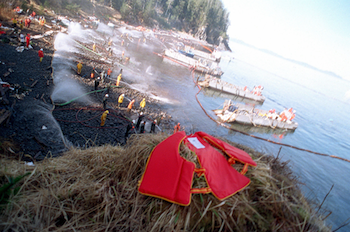It’s the time of year when I want nothing more than to be on the water. And of course I say that as a non-fisherman. I’m just one of the many recreational users of our waterways. (Hence, my fair-weather friendship.)
I write often about conflicts among user groups, and naturally many fishing groups keep a hairy eyeball on the oil industry. The threat of oil spills, as we’ve seen most recently in California, is daunting for those who make their living harvesting the ocean’s creatures.
Mishaps, after all, are guaranteed. Humans make mistakes. So we must assume when we allow oil and gas exploration and drilling in a fishing rich area that there will be leaks and spills — ideally not catastrophic ones.
But if anyone can understand what it’s like to be maligned, it’s commercial fishermen. Fleets and individual boat owners all over the country have made great strides to improve their selectivity, fuel consumption, onboard safety, product quality and overall sustainability. And yet, there is plenty of negative press about how commercial fishing has depleted resources to the point of no return.
The solution, we chant on a seemingly endless loop, is gear and tech improvement. And I say that’s just the kind of commitment we’d like to see from the oil and gas sector.
Enter: sugar-based surfactant. According to Maritime Executive magazine, researchers at the City College of New York have developed a biodegradable agent that can clean up water-based light crude oil spills.
If you’ve followed the Deepwater Horizon spill coverage, you’re likely familiar with Corexit, the chemical surfactant that sank the gushing oil to the seabed. We will never know what the results would have been without Corexit. But we may also never know the damage these patches of oil have caused to marine ecosystems, as much of the coagulated oil remains on the sea floor.
A biodegradable surfactant could be the first step in harmonious coexistence for the oil and fishing industries, not only in politics but in practice.







